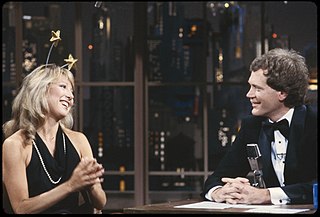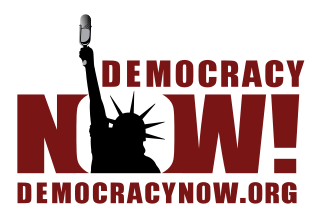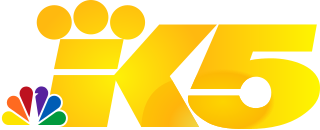
The Fox Broadcasting Company, commonly known simply as Fox and stylized in all caps, is an American commercial broadcast television network owned by the Fox Entertainment division of Fox Corporation. Headquartered at 1211 Avenue of the Americas, New York City, Fox has master control operations and additional offices at the Fox Network Center in Los Angeles and the Fox Media Center in Tempe. Launched as a competitor to the Big Three television networks on October 9, 1986, the network went on to become the most successful attempt at a fourth television network. It was the highest-rated free-to-air network in the 18–49 demographic from 2004 to 2012 and 2020 to 2021, and was the most-watched American television network in total viewership during the 2007–08 season.

A talk show is a television programming, radio programming or Podcast genre structured around the act of spontaneous conversation. A talk show is distinguished from other television programs by certain common attributes. In a talk show, one person discusses various topics put forth by a talk show host. This discussion can be in the form of an interview or a simple conversation about important social, political or religious issues and events. The personality of the host shapes the tone and style of the show. A common feature or unwritten rule of talk shows is to be based on "fresh talk", which is talk that is spontaneous or has the appearance of spontaneity.
Lifetime is an American basic cable channel that is part of Lifetime Entertainment Services, a subsidiary of A&E Networks, which is jointly owned by Hearst Communications and The Walt Disney Company. It features programming that is geared toward women or features women in lead roles. As of January 2016, it is received by 93.8 million households in America.
Broadcast syndication is the practice of content owners leasing the right to broadcast television shows and radio programs to multiple television stations and radio stations, without going through a broadcast network. It is common in the United States where broadcast programming is scheduled by television networks with local independent affiliates. Syndication is less widespread in the rest of the world, as most countries have centralized networks or television stations without local affiliates. Shows can be syndicated internationally, although this is less common.

Democracy Now! is a left-wing hour-long TV, radio, and Internet news program based in Manhattan and hosted by journalists Amy Goodman, Juan González, and Nermeen Shaikh. The show, which airs live each weekday at 8 a.m. Eastern Time, is broadcast on the Internet and via more than 1,400 radio and television stations worldwide.

Television is one of the major mass media outlets in the United States. As of 2011, household ownership of television sets in the country is 96.7%, with approximately 114,200,000 American households owning at least one television set as of August 2013. The majority of households have more than one set. The peak ownership percentage of households with at least one television set occurred during the 1996–97 season, with 98.4% ownership. In 1948, 1 percent of U.S. households owned at least one television while 75 percent did by 1955, and by 1992, 60 percent of all U.S. households received cable television subscriptions.
E! Entertainment Television is an American basic cable television network. It is owned by the NBCUniversal Media Group division of Comcast's NBCUniversal. The channel focuses primarily on pop culture, celebrity based reality shows and movies.
KIRO-TV is a television station in Seattle, Washington, United States, affiliated with CBS and Telemundo. Owned by Cox Media Group, the station maintains studios on Third Avenue in the Belltown section of Downtown Seattle, and its transmitter is located in the city's Queen Anne neighborhood, adjacent to the station's original studios.

KING-TV is a television station in Seattle, Washington, United States, affiliated with NBC. It is owned by Tegna Inc. alongside Everett-licensed independent station KONG. Both stations share studios at the Home Plate Center in the SoDo district of Seattle, while KING-TV's transmitter is located in the city's Queen Anne neighborhood.
KZJO, branded as Fox 13+, is a television station in Seattle, Washington, United States, broadcasting the MyNetworkTV programming service. It is owned and operated by Fox Television Stations alongside Tacoma-licensed Fox outlet KCPQ. The two stations share studios on Westlake Avenue in Seattle's Westlake neighborhood; KZJO's transmitter is located near the Capitol Hill section of Seattle.

KCPQ is a television station licensed to Tacoma, Washington, United States, serving as the Fox network outlet for the Seattle area. It is owned and operated by the network's Fox Television Stations division alongside MyNetworkTV station KZJO. The two stations share studios on Westlake Avenue in Seattle's Westlake neighborhood; KCPQ's main transmitter is located on Gold Mountain in Bremerton.
KSTW, branded on-air as Seattle 11, is an independent television station licensed to Tacoma, Washington, United States, serving the Seattle area. Owned by the CBS News and Stations group, the station maintains studios on East Madison Street in Seattle's Cherry Hill neighborhood, and its transmitter is located on Capitol Hill east of downtown.
KVOS-TV is a television station in Bellingham, Washington, United States, serving the Seattle–Tacoma market as an affiliate of the Spanish-language broadcast network Univision. It is owned by Weigel Broadcasting alongside Seattle-licensed MeTV owned-and-operated station KFFV, channel 44. While KVOS-TV is nominally part of the Seattle market, it can be characterized as a border blaster, as it primarily serves an audience in southwestern British Columbia, Canada, including Vancouver and Victoria. Its other subchannels carry Weigel's other digital multicast television network concepts.

Free Speech TV (FSTV) is an American progressive news and opinion network. It was launched in 1995 and is owned and operated by Public Communicators Incorporated, a 501(c)(3) non-profit, tax-exempt organization founded in 1974. Distributed principally by Dish Network, DirecTV, and the network's live stream at freespeech.org and on Roku, Free Speech TV has run commercial free since 1995 with support from viewers and foundations. The network claims to "amplify underrepresented voices and those working on the front lines of social, economic and environmental justice," predominantly from a progressive perspective.

Foxnet is an American cable television channel that was owned by the Fox Entertainment division of Fox Corporation. Serving as a national feed of the Fox Broadcasting Company, the service is intended for American television markets ranked #100 and above by Nielsen Media Research estimates that lacks availability for a locally based Fox broadcast affiliate.

KVI is a commercial radio station in Seattle, Washington. Owned by Lotus Communications, it airs a conservative talk radio format called "News Talk 570 KVI." Its transmitter is on Vashon Island and its studios and offices are located with former sister station KOMO-TV at KOMO Plaza in Seattle.

KIRO-FM is a commercial radio station licensed to Tacoma, Washington, and serving the Seattle-Tacoma radio market. It airs a news/talk radio format and is owned by Salt Lake City–based Bonneville International, a broadcasting company owned by the Church of Jesus Christ of Latter-day Saints. The studios and offices are located on Eastlake Avenue East in Seattle's Eastlake district.
Seattle Community Access Network (SCAN) is one of the Public, educational, and government access (PEG) cable television channels in Seattle, Washington. The station provides camera equipment, television studios and training that allow residents of King County to create and cablecast their own television shows for a small fee. The station is carried on Comcast and Broadstripe cable systems in King County and the greater Puget Sound region except for six cities covered by Puget Sound Access.

WGN America was an American subscription television network that operated from November 9, 1978 to February 28, 2021. The service was originally uplinked to satellite by United Video Inc. as a national feed of Chicago independent station WGN-TV, making the station's programming available to cable and satellite providers throughout the United States as the second nationally distributed "superstation".













